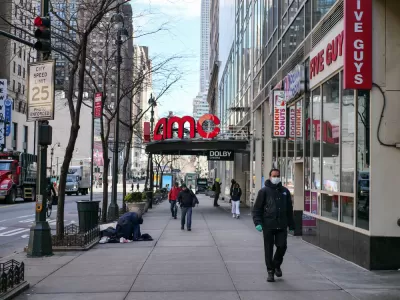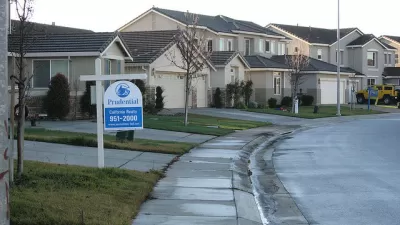Business as usual in the real estate industry is failing the economy and the political and social cohesion of the United States, according to a new initiative launched by the Brookings Institution.

Christopher Coes, Jennifer S. Vey, and Tracy Hadden Loh write to announce a new initiative at the Brooking Institution called the Great Real Estate Reset, anticipating that the U.S. real estate industry is overdue for its next reset—the first since the subprime mortgage crisis of the Great Recession.
Another understanding driving the initiative is the defining role of real estate in the American economy. "It is by far the largest asset class in the United States, comprising over 40% of private assets nationally, followed by bonds, stocks, and cash," according to the article.
The initiative responds to the major forces that have pushed the real estate industry to the current moment in history, and, importantly, "[articulates] the practices and policies the industry and the public sector must adopt in order to successfully meet it."
According to this introduction to the Great Real Estate Reset initiative, five converging trends are disrupting the historical fundamentals of the U.S. real estate market: "persistent segregation by race and income, the demographic transformation of America, destabilized regional housing markets, the future of work, and disruptions to the retail ecosystem."
The real estate industry has been slow to react to these changes, and the initiative works to counteract the status quo: "If we continue 'business as usual,' the real estate industry risks not only another market crash, but also becoming a central contributor to the deterioration of American political and social cohesion."
The authors have already published reports focusing on each of the five trends identified above. Links to each follow:
- Separate and unequal: Persistent residential segregation is sustaining racial and economic injustice in the U.S.
- Modernizing family: America’s demographics are transforming, but our housing supply is not
- Risky (housing) business: Distorted and destabilized housing markets are pushing households into climate-risky, low-opportunity communities
- The office, reimagined: The nature of office work is shifting, and so must downtowns
- Retail revolution: The new rules of retail call for small business empowerment
FULL STORY: The Great Real Estate Reset

Alabama: Trump Terminates Settlements for Black Communities Harmed By Raw Sewage
Trump deemed the landmark civil rights agreement “illegal DEI and environmental justice policy.”

Planetizen Federal Action Tracker
A weekly monitor of how Trump’s orders and actions are impacting planners and planning in America.

The 120 Year Old Tiny Home Villages That Sheltered San Francisco’s Earthquake Refugees
More than a century ago, San Francisco mobilized to house thousands of residents displaced by the 1906 earthquake. Could their strategy offer a model for the present?

Opinion: California’s SB 79 Would Improve Housing Affordability and Transit Access
A proposed bill would legalize transit-oriented development statewide.

Record Temperatures Prompt Push for Environmental Justice Bills
Nevada legislators are proposing laws that would mandate heat mitigation measures to protect residents from the impacts of extreme heat.

Downtown Pittsburgh Set to Gain 1,300 New Housing Units
Pittsburgh’s office buildings, many of which date back to the early 20th century, are prime candidates for conversion to housing.
Urban Design for Planners 1: Software Tools
This six-course series explores essential urban design concepts using open source software and equips planners with the tools they need to participate fully in the urban design process.
Planning for Universal Design
Learn the tools for implementing Universal Design in planning regulations.
Clanton & Associates, Inc.
Jessamine County Fiscal Court
Institute for Housing and Urban Development Studies (IHS)
City of Grandview
Harvard GSD Executive Education
Toledo-Lucas County Plan Commissions
Salt Lake City
NYU Wagner Graduate School of Public Service




























